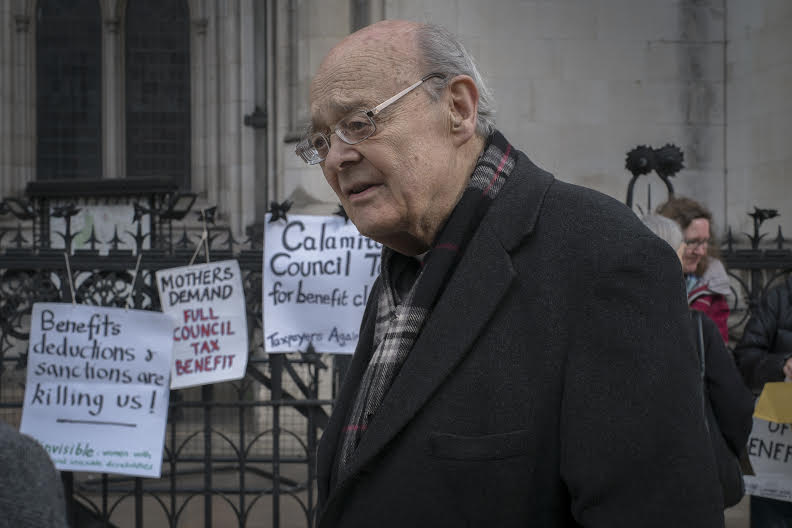Importance of housing underestimated
Posted on 21 Sep 2017 Categories: Blog, Housing, Responses to Rethinking Poverty
by Paul Nicolson
In Rethinking Poverty Barry Knight and the Webb Memorial Trust turned to participatory research to provide opportunities for ‘…individuals on low incomes to develop and express their own ideas’. They rightly began by listening. Likewise, work by the Zacchaeus 2000 Trust (Z2K) with the poorest debtors in London is based on listening.

In 1997, in the aftermath of the poll tax when arrears were still being ferociously enforced, Z2K asked the government what research it was undertaking into the minimum income families need for healthy living. The answer was none. Z2K raised £100,000 to enable the Family Budget Unit to research the minimum income requirement for a couple and a single parent each with two young children. ‘Low Cost but Acceptable: A minimum income standard for the UK’ was published by Policy Press and Z2K in 1999. It showed that unemployment benefits were £39 a week below the minimum income needed after housing costs. Z2K took the research to Unison and London Citizens, who used it to launch the Living Wage campaign in 2001 and to persuade Mayor Ken Livingstone and the Greater London Authority to launch the London Living Wage in 2005.
I feel Rethinking Poverty greatly underestimates the importance of housing for a good life. In contrast, the young people who drafted the Webb-funded Poverty Ends Now (PEN) manifesto, place housing front and centre of their response to poverty:
- A minimum standard of living, not just surviving, for every family in Britain.
- Equal school experience for all.
- Affordable decent homes for everyone.
- Access to affordable healthy meals for every young person.
- A feeling of safety within their communities and at home for every young person.
- Affordable transport for all young people everywhere.
The PEN children’s manifesto of six principles suggests that the five principles for a good life presented in Rethinking Poverty is one short. “Affordable decent homes for everyone” ought to be added to the list. We then have:
- We all have a decent basic standard of living
- And affordable decent homes for everyone
- So we are secure and free to choose how to lead our own lives.
- Developing our potential and flourishing materially and emotionally
- Participating, contributing and treating all with care and respect
- And building a fair and sustainable future for the next generation
On page 95 of this important book the centrality of housing in creating a good society is inadvertently obliterated. Barry Knight quotes BBC editor, Mark Easton, who correctly noted in June 2015 that data ‘so far offers no evidence as to whether welfare reform has a negative or a positive effect on poverty’. Knight states that ‘the evidence is far from conclusive either way.’ I suggest that it is the data that is at fault. The amount left in unemployment benefits after housing costs for a single adult decreased dramatically from 21 per cent of average earnings in 1979 to 10.5 per cent in 2008, according to Professor Jonathan Bradshaw. Subsequent freezes of unemployment benefits, the bedroom tax, the benefit cap, changes in local housing allowance and the cut in council tax benefit alongside increasing rents have together resulted in greater levels of destitution than is acknowledged in Rethinking Poverty. The greatest unfairness of UK poverty lies in the growing inequality between renters and landlords/landowners.
Decades of ignoring the ravages of the housing market has resulted, for the poorest renters and tenants, in the demolition of the very security and fairness which underpin the good society discussed in Rethinking Poverty. Any remedy will need not only leadership from the community but a rethink of governmental culture at national and local level.
Rev Paul Nicolson founded Z2K in 1997 and Taxpayers Against Poverty in 2012
Read more from the Rethinking Poverty discussion forum:
- Starting a conversation – Associate Editor of Alliance magazine, Andrew Milner, on the launch of Rethinking Poverty
- Imagining a new future – former Joseph Rowntree Charitable Trust Secretary, Stephen Pittam on Rethinking Poverty
- Let’s talk about security and freedom – Webb Memorial Trust Director, Barry Knight
Buy Rethinking Poverty (£7.99) or download a copy for free
Posted on 21 Sep 2017 Categories: Blog, Housing, Responses to Rethinking Poverty
